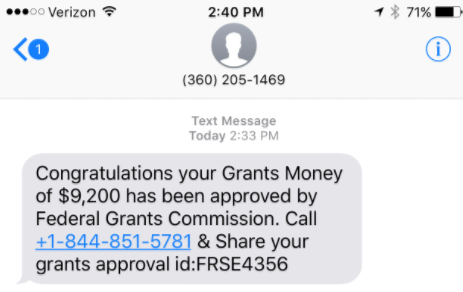To Good To Be True
When a Grant Seems Too Good to be True: A Scam that Offers Free Government Grant Money
Scams that offer free government grant money are easy to spot and should be reported to the BBB Scam Tracker when discovered.
Scammers are always going to try to find a way to trick unsuspecting victims. According to the Better Business Bureau Scam Tracker, a traditional scam where people are offered grants from the government is back in action once again. While the scammer pretends to be offering the victim free grant money, the are actually trying to get bank account information from the individual who is being scammed.
Understanding the Free Grant Money Scam
While traditionally you would receive a phone call about a free government grant you’ve been approved for, scammers are now trying to lure in victims through emails and social media posts as well. The offer is simple, stating that as long as you apply for the grant, you will automatically be accepted into the program. The money is a grant, and the person approved never has to pay back the money. It doesn’t matter what you use the grant money for, according to the scammer, and you can use it to pay for school, pay off your debt, or for a down payment on a new home.
The scam is just too much temptation for some people, and more people take the bait than you would expect.
When a person responds to the ad or agrees to the grant on the phone, the scammer then takes the con to the next level. You’ll be asked for your checking account information so that the grant money can be deposited directly into your bank account. Another excuse the scammer might give is that the bank account information is needed to cover a one-time processing fee. The bottom line is, you won’t see any money and the scammers have just gained your bank account information.
Identifying Characteristics of This Scam:
- The government isn’t going to call or send you an email with an offer. The government usually sends communications through regular mail, and any other forms of communication should be highly suspect.
- You don’t need to pay any money for a free grant from the government. If you have been awarded an original grant from the government, you’ll never be asked to pay a processing fee.
- Don’t believe the caller ID if you receive a phone call from Washington, DC. It’s easy to disguise your number using the internet, and the call could be initiated from anywhere in the world.
- Instead of calling the number provided to you by the scammer, ask for the exact name of their organization. Take the time to look up the group online, and contact the agency using the number you find on your own. You’ll be able to determine if the call is a scam by calling the real agency to see if the offer is valid.
Old scams are brought back all the time, sometimes with a new twist. If you are concerned about a new scam, check the BBB Scam Tracker to report any suspicious activity.
Used by permission






